Items filtered by date: January 2024
Symptoms and Risks of Plantar Warts
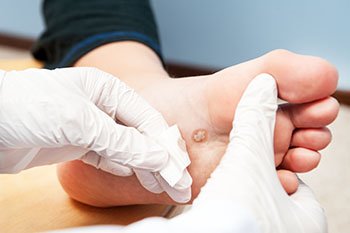
Plantar warts, caused by the human papillomavirus, HPV, can develop in anyone, but certain factors may heighten vulnerability. Individuals with weakened immune systems are at an increased risk, as the body's defense mechanisms struggle to combat the viral invader. The symptoms of plantar warts often include small, fleshy growths on the soles of the feet, accompanied by tenderness or pain while walking. Children and teenagers, with developing immune systems, are particularly susceptible to these uncomfortable growths. Prolonged exposure to moist environments, such as communal showers or swimming pools, also escalates the risk. Additionally, those who frequently walk barefoot in public spaces may find themselves more prone to contracting the virus. If you have developed a plantar wart, it is strongly suggested that you visit a podiatrist who can offer effective treatment options and prevention tips.
Plantar warts can be very uncomfortable. If you need your feet checked, contact the foot specialists from Table Mountain Foot and Ankle. Our doctors will assist you with all of your foot and ankle needs.
About Plantar Warts
Plantar warts are the result of HPV, or human papillomavirus, getting into open wounds on the feet. They are mostly found on the heels or balls of the feet.
While plantar warts are generally harmless, those experiencing excessive pain or those suffering from diabetes or a compromised immune system require immediate medical care. Plantar warts are easily diagnosed, usually through scraping off a bit of rough skin or by getting a biopsy.
Symptoms
- Lesions on the bottom of your feet, usually rough and grainy
- Hard or thick callused spots
- Wart seeds, which are small clotted blood vessels that look like little black spots
- Pain, discomfort, or tenderness of your feet when walking or standing
Treatment
- Freezing
- Electric tool removal
- Laser Treatment
- Topical Creams (prescription only)
- Over-the-counter medications
To help prevent developing plantar warts, avoid walking barefoot over abrasive surfaces that can cause cuts or wounds for HPV to get into. Avoiding direct contact with other warts, as well as not picking or rubbing existing warts, can help prevent the further spread of plantar warts. However, if you think you have developed plantar warts, speak to your podiatrist. He or she can diagnose the warts on your feet and recommend the appropriate treatment options.
If you have any questions please feel free to contact our office located in Wheat Ridge, CO . We offer the newest diagnostic and treatment technologies for all your foot and ankle needs.
Do Your Child's Feet Hurt?
Common Reasons Why Feet Can Swell
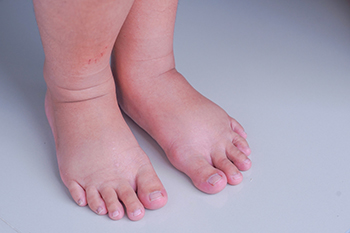
Swollen feet, or edema, can disrupt daily life. This condition often has a spectrum of common causes that individuals should be attuned to for timely intervention and relief. Prolonged periods of standing or sitting, especially in positions that impede healthy blood circulation, can lead to fluid retention, resulting in swollen feet. Another frequent contributor is the choice of footwear, with ill-fitting shoes or high heels imposing pressure that hinders proper blood flow. Injuries, such as sprains or fractures, can trigger inflammation and swelling in the affected area. Underlying medical conditions, including venous insufficiency, arthritis, or heart failure, may manifest in swollen feet. Hormonal changes during pregnancy often result in fluid retention, causing noticeable swelling in the feet and ankles. Lifestyle factors, like a diet high in sodium, can exacerbate fluid retention. Swollen feet can be uncomfortable, and if you have this condition, it is suggested that you visit a podiatrist who can accurately determine the cause, and offer appropriate treatment tips.
Swollen feet can be a sign of an underlying condition. If you have any concerns, contact the foot specialists of Table Mountain Foot and Ankle. Our doctors can provide the care you need to keep you pain-free and on your feet.
Swollen feet are a common ailment among pregnant women and people who stand or sit for extended periods. Aging may increase the possibility of swollen feet and patients who are obese often notice when their feet are swelling too. There may be medical reasons why swollen feet occur:
- Phlebitis - A condition that causes the veins to become inflamed and can also cause leg pain.
- Liver disease - This may lead to low blood levels of albumin which is a protein. This can cause fluid in the blood to pass into the tissues and several areas of the body can become swollen.
- Heart failure - When the heart doesn’t pump properly the blood that is normally pumped back to the heart can pool in the veins of the legs causing swollen feet.
- Kidney disease - One of the main functions of the kidneys is releasing excess fluid in the body. This type of condition can make it difficult for the kidneys to function properly, and as a result the feet may become swollen.
- Deep-vein thrombosis (DVT)- This is a serious condition where blood clots form in the veins of the legs. They can block the return of blood from the legs to the heart which may cause the feet to swell. It is important to be treated by a podiatrist if this condition is present.
Swollen feet can also be caused by bone and tendon conditions, including fractures, arthritis, and tendinitis. Additionally, there may be skin and toenail conditions and an infection may cause the feet to swell. Patients who take medicine to treat high blood pressure may be prone to getting swollen feet.
Many patients elevate their feet to help relieve the swelling and this is generally a temporary remedy. When a podiatrist is consulted the reason behind the swelling can be uncovered and subsequently treated.
If you have any questions please feel free to contact our office located in Wheat Ridge, CO . We offer the newest diagnostic tools and technology to treat your foot and ankle needs.
Is It Gout or Rheumatoid Arthritis?
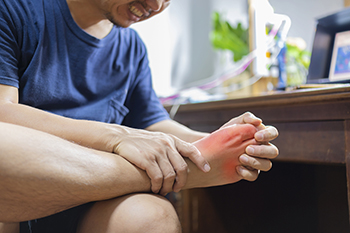
There are many types of arthritis, with rheumatoid arthritis, or RA, and gout being two distinct but often confused members of this family. While both inflict pain and inflammation upon the joints, the origins and treatment strategies for each differ significantly. Rheumatoid arthritis is an autoimmune inflammatory condition that arises when the immune system mistakenly targets healthy cells in the synovial tissues. This results in pain, swelling, and inflammation. RA can affect ankle joints on both sides of the body and can lead to irreversible joint damage over time. Gout, while also inflammatory, is not autoimmune in nature. It develops from elevated levels of uric acid in the bloodstream. Uric acid, found in certain foods and drinks, as well as influenced by specific medications, forms crystals that deposit in synovial tissues, particularly in the feet, and especially in the big toe. Unfortunately, studies show that some patients with RA also have gout. Obesity is thought to be a link between the two conditions in some cases, as it is a shared risk factor. An accurate diagnosis is paramount for effective treatment. A podiatrist can conduct a series of tests to determine whether your joint pain comes from RA, gout, or both. For help, it is suggested that you schedule an appointment with a podiatrist.
Arthritis can be a difficult condition to live with. If you are seeking treatment, contact the foot specialists from Table Mountain Foot and Ankle. Our doctors can provide the care you need to keep you pain-free and on your feet.
Arthritic Foot Care
Arthritis is a joint disorder that involves the inflammation of different joints in your body, such as those in your feet. Arthritis is often caused by a degenerative joint disease and causes mild to severe pain in all affected areas. In addition to this, swelling and stiffness in the affected joints can also be a common symptom of arthritis.
In many cases, wearing ill-fitting shoes can worsen the effects and pain of arthritis. Wearing shoes that have a lower heel and extra room can help your feet feel more comfortable. In cases of rheumatoid arthritis, the arch in your foot may become problematic. Buying shoes with proper arch support that contour to your feet can help immensely.
Alleviating Arthritic Pain
- Exercises that stretch the foot can prevent further pain and injury and increase mobility
- Most of the pain can be alleviated with anti-inflammatory drugs, heat, and topical medications
- Massages can help temporarily alleviate pain.
It is best to see your doctor for the treatment that is right for your needs and symptoms. Conditions vary, and a podiatrist can help you determine the right method of care for your feet.
If you have any questions, please feel free to contact our office located in Wheat Ridge, CO . We offer the newest diagnostic tools and technology to treat your foot and ankle needs.
Causes of Sesamoiditis
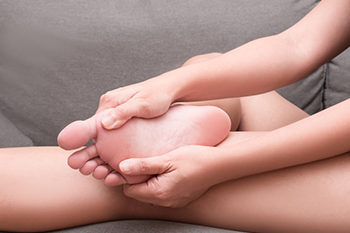
Sesamoiditis is a painful condition brought about by two tiny bones below the big toe. It is caused by the inflammation of the sesamoid bones in the foot, and poses challenges to daily activities, like walking. These pea-sized bones play a vital role in weight-bearing, shock absorption, and load distribution during movements that involve flexing the big toe. Sesamoiditis results from repetitive or excessive stress on these bones and their surrounding tendons. Activities such as running and dancing, which repeatedly stress the forefoot, can lead to such irritation and inflammation. Trauma, such as direct injuries or heavy objects landing on the foot, is another common cause, as the sesamoid bones or their adjacent structures may be damaged. Wearing improper footwear, especially shoes lacking cushioning or high heels, increases forefoot pressure, and can contribute to sesamoiditis. Structural abnormalities, like a high arch, alter weight distribution and heighten susceptibility. Tight or inflexible tendons create strain, making the sesamoid bones more prone to irritation. If you are experiencing symptoms that seem to indicate sesamoiditis, it is suggested that you schedule an appointment with a podiatrist for an exam and treatment options.
Sesamoiditis is an unpleasant foot condition characterized by pain in the balls of the feet. If you think you’re struggling with sesamoiditis, contact the foot specialists of Table Mountain Foot and Ankle. Our doctors will treat your condition thoroughly and effectively.
Sesamoiditis
Sesamoiditis is a condition of the foot that affects the ball of the foot. It is more common in younger people than it is in older people. It can also occur with people who have begun a new exercise program, since their bodies are adjusting to the new physical regimen. Pain may also be caused by the inflammation of tendons surrounding the bones. It is important to seek treatment in its early stages because if you ignore the pain, this condition can lead to more serious problems such as severe irritation and bone fractures.
Causes of Sesamoiditis
- Sudden increase in activity
- Increase in physically strenuous movement without a proper warm up or build up
- Foot structure: those who have smaller, bonier feet or those with a high arch may be more susceptible
Treatment for sesamoiditis is non-invasive and simple. Doctors may recommend a strict rest period where the patient forgoes most physical activity. This will help give the patient time to heal their feet through limited activity. For serious cases, it is best to speak with your doctor to determine a treatment option that will help your specific needs.
If you have any questions please feel free to contact our office located in Wheat Ridge, CO . We offer the newest diagnostic and treatment technologies for all your foot and ankle needs.
Walking With a Foot Stress Fracture
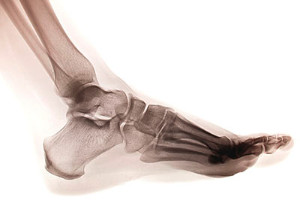
A foot stress fracture, a microscopic crack in a bone often caused by repetitive impact or overuse, can significantly alter the way you navigate the world on your feet. Walking with a stress fracture demands a delicate balance between maintaining mobility and allowing the injured foot to heal. Each step becomes a conscious effort to minimize impact and avoid exacerbating the fracture. The process requires patience, as rushing the recovery may prolong the healing time or lead to complications. Choosing appropriate footwear with ample cushioning and support is paramount, providing a protective barrier between the foot and the ground. Embracing a modified walking style, which involves shorter strides and a more controlled gait, may help to alleviate strain on the fractured area. If you believe you have a foot stress fracture, it is suggested that you seek advice from a podiatrist for an exam and appropriate treatment options.
Activities where too much pressure is put on the feet can cause stress fractures. To learn more, contact the foot specialists from Table Mountain Foot and Ankle. Our doctors can provide the care you need to keep your pain free and on your feet.
Dealing with Stress Fractures of the Foot and Ankle
Stress fractures occur in the foot and ankle when muscles in these areas weaken from too much or too little use. The feet and ankles then lose support when walking or running from the impact of the ground. Since there is no protection, the bones receive the full impact of each step. Stress on the feet can cause cracks to form in the bones, thus creating stress fractures.
What Are Stress Fractures?
Stress fractures occur frequently in individuals whose daily activities cause great impact on the feet and ankles. Stress factors are most common among:
- Runners
- People affected with Osteoporosis
- Tennis or basketball players
- Gymnasts
- High impact workouts
Symptoms
Pain from the fractures occur in the area of the fractures and can be constant or intermittent. It will often cause sharp or dull pain with swelling and tenderness. Engaging in any kind of activity which involves high impact will aggravate pain.
If you have any questions please feel free to contact our office located in Wheat Ridge, CO . We offer the newest diagnostic and treatment technologies for all your foot and ankle needs.

